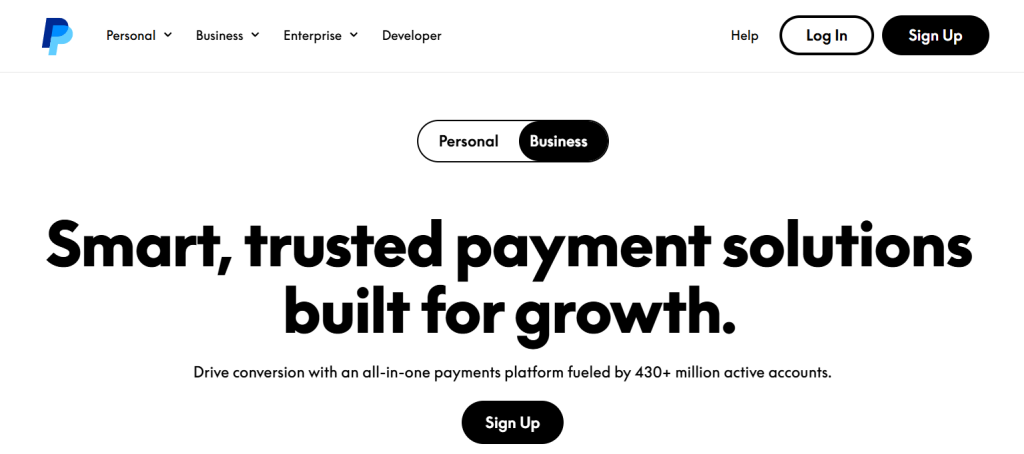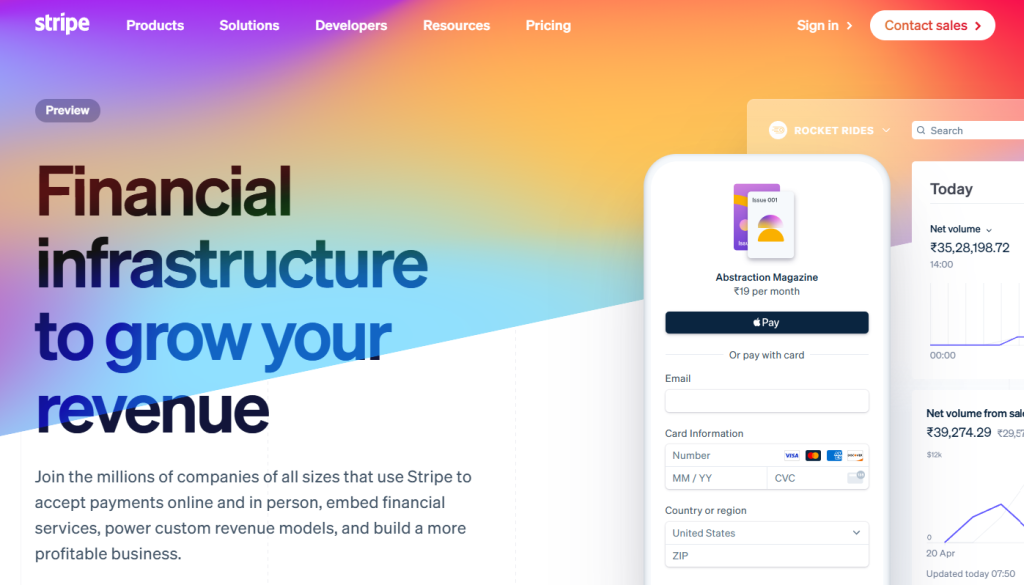The information about Paypal, Stripe & Payoneer in this blog was sourced from publicly available materials on 2026. Please note that details may be subject to change.
Choosing the right payment processor is one of the most important decisions for businesses, whether you’re just starting out or scaling internationally. With leading names like PayPal, Stripe, and Payoneer offering a wide range of features, making an informed decision can feel challenging.
This blog provides a detailed comparison of these three platforms, focusing on their strengths, limitations, and ideal use cases. Whether your priority is seamless payment processing, cross-border transactions, or customisable solutions, we’ll help you identify the best option for your business needs.
Let us guide you through:
1.Company Backgrounds
PayPal

Founded in 1998, PayPal is one of the earliest pioneers in online payments. It is globally recognised for its user-friendly platform and secure transaction handling. Over the years, PayPal has expanded to serve individuals, small businesses, and enterprises, offering a variety of tools for online payments, invoicing, and more
Stripe

Launched in 2010, Stripe is known for its developer-friendly approach and robust APIs. With a focus on e-commerce and digital-first businesses, Stripe has quickly become a favorite among companies looking for highly customisable payment solutions. It is widely adopted by startups and enterprises alike for its global reach and cutting-edge technology.
📚 Learn more about Stripe Connect
Payoneer

Payoneer, established in 2005, focuses on cross-border payments and empowering freelancers, SMBs, and online sellers. With its ability to handle payments across multiple currencies, Payoneer is particularly popular among businesses and individuals operating in global markets.
2.Payment Features Comparison
When evaluating payment processors, understanding their features is crucial. PayPal, Stripe, and Payoneer each bring unique capabilities to the table, making them suitable for different business needs. Here’s how they compare:
PayPal
PayPal is renowned for its versatility and simplicity, offering a range of payment options:
- Supported Methods: Accepts credit/debit cards, PayPal balances, bank transfers, and alternative payment methods like Venmo (in the US).
- Payouts and Refunds: Supports quick refunds and payouts to linked accounts.
- Checkout Experience: Provides ready-to-use checkout buttons and integrations for e-commerce platforms, making it easy for businesses to get started.
PayPal’s user-friendly platform is ideal for small businesses and freelancers looking for a plug-and-play solution. However, its fees for international payments and certain features can add up, especially for larger operations.
Stripe
Stripe is favored for its developer-centric approach and flexibility:
- Supported Methods: Handles payments from credit/debit cards, Apple Pay, Google Pay, ACH transfers, and more.
- Customisable Checkout: Offers a fully customisable checkout flow through its APIs, allowing businesses to design a seamless customer experience.
- Global Support: Provides extensive international payment support, making it a go-to choice for e-commerce businesses operating in multiple countries.
Stripe’s robust APIs and extensive payment options make it highly suitable for tech-savvy businesses seeking flexibility and scalability. However, it may require developer expertise for setup and maintenance.
Payoneer
Payoneer specialises in cross-border payments, catering to freelancers, SMBs, and online sellers:
- Supported Methods: Enables businesses to receive payments from international clients via bank transfers, credit cards, and platforms like Amazon and Upwork.
- Multi-Currency Support: Offers local receiving accounts in multiple currencies, simplifying global transactions.
- Mass Payments: Provides tools for businesses to make bulk payments to vendors, contractors, and affiliates.
Payoneer’s strength lies in facilitating cross-border payments efficiently. However, it lacks some advanced features like customisable checkouts, making it less suitable for businesses needing a highly tailored solution.
| Feature | PayPal | Stripe | Payoneer |
|---|---|---|---|
| Supported Methods | Credit/debit cards, PayPal balance | Credit/debit cards, ACH, digital wallets | Bank transfers, credit cards |
| International Payments | Supported, higher fees | Extensive, competitive rates | Excellent, tailored for global use |
| Custom Checkout | Limited | Fully customisable | Not available |
| Mass Payments | Limited | Supported | Available |
| Ideal For | Small businesses, freelancers | E-commerce, tech-savvy businesses | Freelancers, SMBs with global clients |
3.Pricing and Costs
Understanding the pricing structure is critical when choosing a payment processor. Here’s how PayPal, Stripe, and Payoneer compare in terms of costs and fees:
PayPal
PayPal’s pricing model is straightforward but can become expensive for international transactions and specific services:
- Transaction Fees: Domestic payments typically incur 2.9% + $0.30 per transaction. For international payments, fees can go as high as 4.4% + fixed fees based on currency.
- Additional Fees: Includes fees for currency conversions (~3-4%) and withdrawals to bank accounts in non-local currencies.
- Subscription Options: Offers plans like PayPal Payments Pro starting at $30/month, which provides additional customisation and payment options.
PayPal’s pricing is suitable for small-scale businesses but may become less competitive as transaction volumes and international sales increase.
Stripe
Stripe offers transparent and competitive pricing, making it a favorite among developers and e-commerce businesses:
- Transaction Fees: Domestic transactions are charged at 2.9% + $0.30, similar to PayPal. For international cards, an additional 1% fee applies.
- Additional Fees: Stripe charges 1% for currency conversion and other advanced features like billing or fraud detection.
- Custom Pricing: Enterprise-level customers can negotiate custom pricing based on transaction volume.
Stripe’s pricing is ideal for businesses looking for transparency and flexibility, especially for global operations with moderate to high transaction volumes.
Payoneer
Payoneer’s pricing is tailored for businesses handling cross-border payments:
- Receiving Payments: Free for Payoneer-to-Payoneer transactions. Receiving funds from non-Payoneer users incurs a fee of 3% for credit card payments and 1% for ACH bank transfers.
- Withdrawal Fees: Withdrawing funds to a local bank account costs $1.50. Currency conversions typically include a 2% fee above the mid-market rate.
- Annual Account Fees: Payoneer may charge an annual fee (typically $29.95) for account maintenance.
Payoneer’s cost structure is best for businesses and freelancers managing international transactions regularly, though the fees can add up for small, frequent payments.
| Cost Element | PayPal | Stripe | Payoneer |
|---|---|---|---|
| Domestic Transaction Fees | 2.9% + $0.30 | 2.9% + $0.30 | Free for Payoneer-to-Payoneer transfers |
| International Fees | 4.4% + fixed fee (currency-dependent) | 2.9% + $0.30 + 1% (international cards) | 1-3% (credit card/ACH payments) |
| Currency Conversion | ~3-4% | 1% | ~2% above the mid-market rate |
| Withdrawal Fees | Free (local currency), 1-2% (others) | Free (local accounts), fees vary by bank | $1.50 (local bank), conversion charges |
| Ideal For | Small businesses, occasional global sales | E-commerce and tech-savvy businesses | Cross-border freelancers and SMBs |
4.Security, Compliance, and Customer Support
Security and compliance are non-negotiable factors when choosing a payment processor. Ensuring that your transactions are safe and that the platform meets regulatory standards is essential. Here’s how PayPal, Stripe, and Payoneer compare:
PayPal
- Security: PayPal uses advanced encryption and fraud detection to secure transactions. It offers buyer and seller protection, minimising risks during disputes.
- Compliance: PayPal is PCI DSS-compliant and adheres to financial regulations in all its operating countries, making it a trusted platform for global transactions.
- Customer Support: PayPal provides support through various channels, including a help center, community forums, and live chat. However, users have reported delays in resolving account-related issues, especially during high-traffic periods.
Stripe
- Security: Stripe employs robust security measures, including end-to-end encryption, tokenisation, and real-time fraud detection tools. Its Radar feature uses machine learning to identify and prevent fraudulent activities.
- Compliance: Stripe is fully PCI DSS-compliant and supports GDPR compliance for businesses operating in Europe. It also offers tools to help businesses navigate local tax and regulatory requirements.
- Customer Support: Stripe offers 24/7 support through email and live chat. Additionally, its extensive documentation and developer resources make it easy for businesses to troubleshoot independently.
Payoneer
- Security: Payoneer prioritises user safety with two-step verification, advanced encryption, and continuous monitoring for suspicious activities.
- Compliance: Payoneer complies with global financial regulations, including PCI DSS, and is regulated by financial authorities such as the FCA in the UK.
- Customer Support: Payoneer provides multilingual support through email, live chat, and a dedicated help center. It also offers tailored assistance for businesses managing large-scale international transactions.
| Aspect | PayPal | Stripe | Payoneer |
|---|---|---|---|
| Security | Advanced encryption, buyer/seller protection | End-to-end encryption, Stripe Radar | Two-step verification, encryption |
| Compliance | PCI DSS, global financial regulations | PCI DSS, GDPR compliance | PCI DSS, FCA-regulated |
| Support | Help center, live chat, forums | 24/7 live chat, email, extensive documentation | Email, live chat, multilingual support |
Pros and Cons
Choosing the right payment processor depends on your business’s needs, whether you’re prioritising international payments, customisable solutions, or simple and reliable payment methods. Let’s recap the pros and cons of PayPal, Stripe, and Payoneer to help you make an informed decision.
PayPal
Pros:
- Widely recognised and trusted by consumers worldwide.
- Easy to set up and use, making it ideal for small businesses and freelancers.
- Comprehensive buyer and seller protection policies.
Cons:
- High fees for international transactions and currency conversions.
- Limited customisation options for checkout experiences.
- Account freezes have been reported by some users.
Stripe
Pros:
- Highly customisable with robust APIs for tailored payment solutions.
- Transparent pricing structure with competitive fees for international payments.
- Advanced security tools like Stripe Radar for fraud prevention.
Cons:
- Requires technical expertise for setup and integration.
- Primarily suited for online transactions, with fewer options for in-person payments.
Payoneer
Pros:
- Excellent for cross-border payments with support for multiple currencies.
- Affordable and straightforward pricing for international transfers.
- Tailored for freelancers, SMBs, and businesses with global clients.
Cons:
- Limited features for highly customised checkout processes.
- Fees can add up for frequent withdrawals and currency conversions.
Get Started
Start your 14-day free trial today and see why businesses trust Finexer for secure, compliant, and tailored open banking solutions.
Finexer: An Affordable Alternative
If you’re a startup or SMB searching for a cost-effective solution, Finexer offers a game-changing approach to payments with its Open Banking-powered platform. Unlike traditional processors, Finexer eliminates card fees, enabling instant account-to-account payments, bulk payouts, and Variable Recurring Payments (VRPs)—all at a fraction of the cost. Businesses can save up to 90% on transaction fees, freeing up resources for growth.
Designed for simplicity and scalability, Finexer is the ideal choice for UK-based businesses seeking a modern, affordable, and efficient payment solution tailored to their unique needs.
📚 Finexer for Startups & SMB’s in the UK
Ideal for Startups and SMBs
Finexer is particularly suited for businesses that:
- Operate within the UK and need a reliable, Open Banking-powered solution.
- Want to avoid high card processing fees and reduce overheads.
- Require scalable payment solutions without heavy technical requirements.
- PayPal: Extra charges for currency conversion (around 3–4%) and some withdrawals.
- Stripe: A 1% fee for international payments plus potential add-ons for premium features.
- Payoneer: An annual account fee (~$29.95) and withdrawal fees.
- PayPal: Easy to set up with pre-built buttons but has limited branding options.
- Stripe: Simpler with Stripe Checkout, though deeper customisation may require coding or plugins.
- PayPal: Sometimes freezes funds due to buyer/seller protection policies.
- Stripe: May hold money if it flags unusual transaction patterns.
- Payoneer: Tends to have fewer complaints.

Try Open Banking with Finexer in 2025 ! Schedule your free demo and get a 14 days Trial by Finexer 🙂
